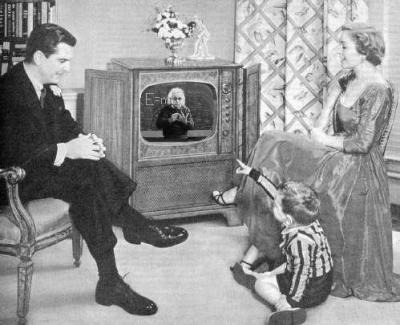Today marks the ten-year anniversary of the death and two men; men whose deaths made an incredible mark on the world. One of these men was Kurt Cobain. You can't turn your head without being reminded of the man who made rock'n roll cool again. He's been on every magazine cover and entertainment show for the past month -- pretty ubiquitous for a dead guy. To be honest, I didn't really get into Nirvana until after Cobain's death, so I was pretty late to the party (For instance, I don't remember where I was when I heard Kurt Cobain died. In fact, I probably didn't even care when I heard). Their Unplugged album was the first that really made me take notice; and I'll argue with anyone that In Utero beats out Nevermind for their best studio work. Cobain's death said something about rock'n roll culture that we tend to forget sometimes: Drugs and rock'n roll don't always mean partying; they can sometimes mean depression. We knew Kurt was screwed up from the beginning, we just hoped success might help him find fulfillment. In the end, it might have driven him to an earlier death.
But for the all the attention on Kurt Cobain in the media, there was another man who died the same day, whose death was the catalyst for the death of hundreds of thousands of people. But because these people didn't speak English, no one really cares. The same day Kurt Cobain shot himself, Juvenal Habyarimana died when his plane was shot down in Africa. Juvenal was the president of Rwanda; to this day, no one is sure who murdered him. But his death allowed extremists to take over the Rwandan government, allowing them the free reign to massacre some 800,000 Rwandans, who were part of a different tribe than their own.
There were 247 Americans in Rwanda when the president was assassinated. By the time the U.S. began mourning Kurt Cobain's death five days later, all but one American had left Rwanda. A small U.N. peacekeeping force was already located in Rwanda, to keep the warring tribes apart from each other. But since there were not any Americans in that force, the U.S. had no reason to stay. The U.N. force warned us what was going to happen. One of the tribes was planning on exterminating the other tribe. But just a few months earlier, the U.S. had been caught up in a similar situation in Somalia (the events that inspired the movie Black Hawk Down). Since that time, the American public (and Congress) did not have the patience for another peace keeping mission that would put American lives in danger. So we pulled out. We left. The Rwandan government killed over 800,000 people, mostly through roving bands of men, armed with only machettes. They would hack at their victims until they died, then move onto another area. It was planned to a "T", systematic in a way that would have been the envy of Hitler. It lasted for 100 days, before the tribe being massacred could stop the government with an army of their own. During that time, three quaters of the U.N. force was recalled, and only one other American civilian came back to help.
Most of the assistance given to Rwandans during that time was in the form of medical aid. The Red Cross saved 65,000 lives during that time, and the U.N. was able to protect a few thousand more. But because the peacekeeping force was so small, and the U.S. refused to send aid, there was little they could do. The U.N. force was so under-equipped that some of the U.N. safe zones were protected by officers without weapons. Simply their presence was enough to keep the death squads clear.
For weeks, the U.S. refused to call what was happening genocide. By the time it was over, there was no way to deny what it was. In the first two weeks, 100,000 people were killed. One journalist pointed out that the Rwandan government killed at a rate three times faster than the Nazis.
As of today, only Koffi Anan (the head of the U.N. at the time), has publicly apologized for not doing more for the Rwandan people. Bill Clinton made a visit during his presidency, but never apologized during his speech. His visit lasted three and a half hours. While he was there, Air Force One never turned off her engines. The Pentagon, under Colin Powell at the time, never issued an apology. Congress did not either. The American people never realized that we needed to.
This week Rwanda, there are events marking the ten year remembrance of the tragedy. To represent the United States, we did not send our President, our Vice-President, our Secretary of State, our Under-Secretary of State, any member of the House or Senate, any member of Bush's Cabinet. Our representative is the US Ambassador for War Crimes (who knew we even had an ambassador for that?). Only one head-of-state from a Western nation will be making the trip for the ceremonies.
In 1994, the U.S. turned a blind eye to a small African country where as many as one million people were slaughtered, while mourning the death of a tragic rock'n roll star. Ten years later, we're still doing the same thing.
Rest in peace, Kurt Cobain. Because the people of Rwanda never will.
Monday, April 05, 2004
A Death In The Family
Posted by
jonny
at
7:51 PM
![]()
Subscribe to:
Post Comments (Atom)




No comments:
Post a Comment